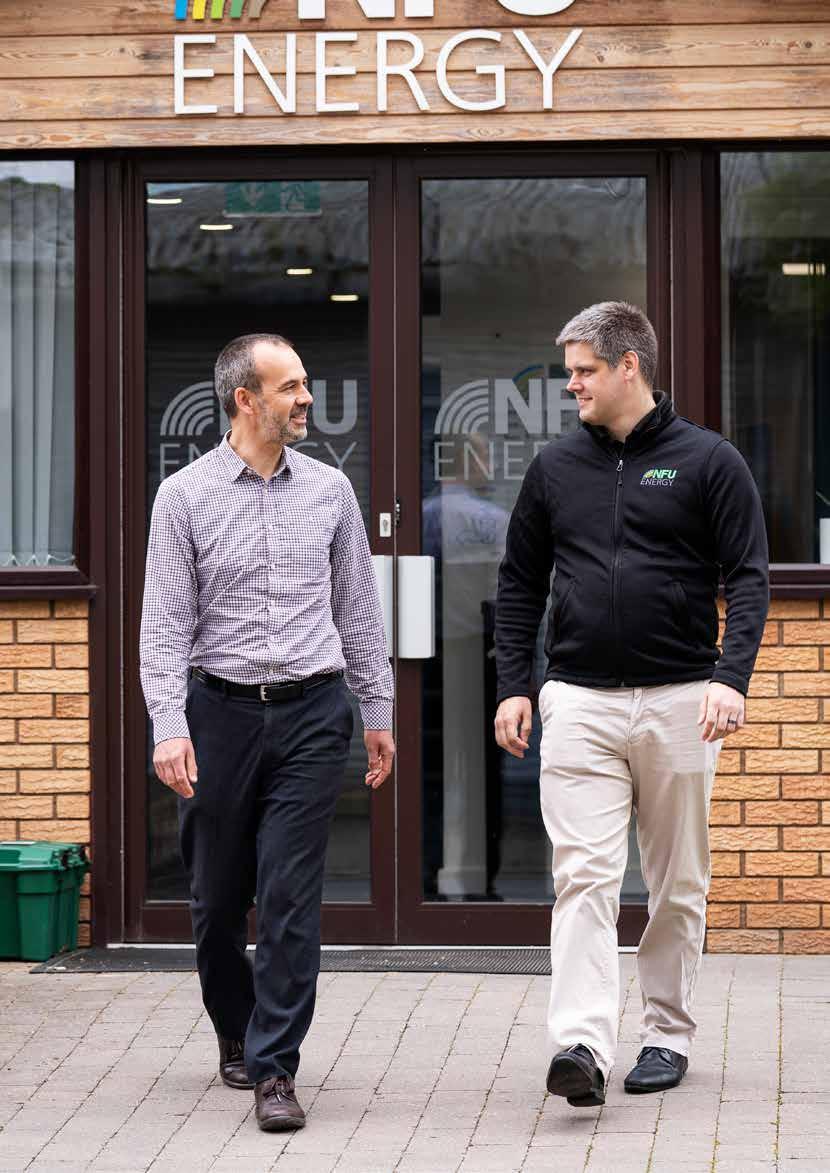




With decades of combined experience in the farming and energy sectors, our dedicated team is here to help NFU members buy, sell and generate energy, become more energy efficient, reduce their carbon footprint and comply with various schemes and regulations. Our edge lies in our people, our commitment to excellence and innovation, and our personalisation. We recognise that each business is distinct, and so are their energy requirements. So, whether you’re looking to reduce costs, explore renewable energy options, or optimise usage, we’ve got the expertise you need. In this article, we’re proud to introduce the faces behind our success of a few key team members who are committed to supporting the farming community in tackling its unique energy challenges.


Gemma is one of NFU Energy’s Energy Account Managers responsible for the dayto-day management of clients who have substantial electricity generation facilities. Working closely with our team of experts, Gemma arranges transparent, competitive energy contracts for electricity and gas, manages bill checks, and handles invoicing on behalf of clients. She provides detailed reporting and forecasting, and helps clients sell energy directly to end users, managing deals and billing. With a focus on personalised support, Gemma ensures challenges are handled and opportunities are maximised, offering clients confidence in their energy management.


Max specialises in supporting customers who export power to the grid. With extensive experience in energy markets and grid connection agreements, Max helps clients with power export, ensuring they maximise revenue from their energy generation. He is also highly skilled in resolving billing queries, working directly with suppliers to correct errors, address discrepancies, and ensure accurate payments. Max’s thorough understanding of tariffs, contracts, and grid regulations enables him to provide expert guidance, helping businesses streamline their energy export processes and resolve any issues quickly.

Claire Bissell, Senior Technical Administrator

Claire and her team are fundamental in running the processes that form part of NFU Energy’s energy account management services, including, but not limited to, Periodic Data Submissions (PDS) for incentive schemes such as the Renewable Heat Incentive (RHI), Feed in Tariff (FiT), Renewable Obligations (RO) and Renewable Energy Guarantees of Origin (REGOs). Claire also supports client relations through phone and written communications and ensures technical admin is completed with accuracy.

Thomas brings over 10 years of expertise in the Non-Domestic Renewable Heat Incentive (RHI) scheme. As an expert in this field, Thomas has an in-depth understanding of accreditation and compliance, ensuring clients receive maximum benefits from renewable heat technologies while meeting all regulatory requirements.
In his role, Thomas meticulously reviews renewable heat system setups and operations, conducting comprehensive HealthChecks to guarantee optimal performance and eligibility for RHI incentives.

Roger Stones is the Technical Lead at NFU Energy, with a deep understanding of sustainable energy and how to utilise it effectively in the agriculture and horticulture sector. He specialises in conducting energy efficiency audits and renewables feasibility assessments, improving energy systems to enhance both sustainability and efficiency, and helping businesses reduce their carbon footprint while maintaining financial viability.
Roger is committed to supporting the farming industry in achieving a low-carbon future, providing expert guidance on energysaving strategies and system enhancements. As an ESOS Lead Assessor, he ensures compliance with energy regulations and helps businesses optimise energy usage. His expertise drives innovation and sustainable practices, making him a trusted adviser for clients aiming to balance environmental goals with profitability.

James is one of the first points of contact for farmers and growers seeking expert energy advice. With a wealth of experience, James is on hand to advise customers about the various services NFU Energy can tailor to the unique operations of agricultural and horticultural businesses. Whether it’s a full 360-degree energy management package; support with energy compliance such as RHI, the Climate Change Agreement or the Combined Heat and Power Quality Assurance (CHPQA) scheme, or one-off services in carbon reporting, energy efficiency audits or renewable feasibility assessments, James’ hands-on approach ensures that farmers receive the right support to optimise their energy use and improve sustainability across their operations.

As a farmer or grower, managing your utility expenses effectively is essential to maintaining profitability. At NFU Energy, our dedicated Utilities Contract Management team is here to help you secure the best deals on your utilities, allowing you to focus on what really matters—your business.
Here’s how we can help you take control of your utility costs:
• Electricity Contracts – We work with approved suppliers to negotiate the best electricity deals based on your usage patterns, ensuring you get the most competitive rates.
• Gas Contracts – Our team will source the best gas contracts for your farm, helping you manage volatile gas prices and ensuring your operations continue smoothly without any costly surprises.
To secure the best deals on your electricity and gas contracts, contact the Utility Contracts Management team on 024 7669 8885. Let us handle the negotiations, so you can focus on running your farm efficiently and profitably.
As part of the NFU Energy Buying Groups, NFU members benefit from collective purchasing power. By grouping together with other agricultural and horticultural businesses, you can receive better rates on utilities and access bespoke contract terms that wouldn’t be available to individual customers. Our Buying Groups take place every month, rolled out in conjunction with one of our approved suppliers. As an added benefit, we offer members exclusive rewards, from vouchers to free standing charges.



Due to constant changes in the energy market, standing charges and their banding have become a concern for many customers. To help reduce standing charge banding and subsequently lower energy costs, we have introduced our TCR Banding Reduction Service. TCR introduced new regulations that determine how much businesses pay for the upkeep of the electricity grid. If your farm has been placed in a higher charging band than necessary, you could be paying more than you should. Our team will assess your TCR banding and, where applicable, help you secure a reduction. This ensures your electricity charges accurately reflect your farm’s consumption, potentially leading to significant savings.


19,000+ NFU members have energy contracts with NFU Energy
We know farming hours aren’t your typical 9am-5pm, and you don’t always have time to call our team. That’s why our Energy Price Comparison Tool is available 24/7, letting you compare the best energy deals whenever it suits you. Whether you’re an early riser starting the first milking of the herd or combining late into the night, you can easily browse a range of energy suppliers and secure the most competitive rates for your farm. With just a few clicks, you can take control of your energy costs on your own time.
We know how complex and timeconsuming it can be to manage utility contracts on top of running a farm. That’s why our Utilities Contract Management team provides expert support at every stage – from initial contract negotiations to ongoing monitoring and renewal advice.

NFU Energy has distributed £38,000 worth of vouchers to NFU members through the NFU Energy Buying Groups
NFU Energy has saved one of its customers
£50,000 on their annual energy spend by reducing their standing charges.


Supplying � l�rg� numb�r of custom�rs within th� f�rming �nd �gricultur� industry.

Reduce your business carbon footprint
R�ducing c�rbon �missions is �ss�nti�l for t�ckling th� glob�l issu� of clim�t� ch�ng� �nd r�li�nc� on fossil fu�ls.
Off�ring Z�ro C�rbon contr�cts �s st�nd�rd �nd n�tur�l r�n�w�bl� upgr�d�s.** Custom�rs on our N�tur�l R�n�w�bl� �l�ctricity for busin�ss product will r�c�iv� � British G�s c�r�ific�t� �s �vid�nc� to us� in GHG Protocol Scop� 2 r�porting.
Solar Panels generate additional revenue
W�’ll p�y you for �v�ry kw/hour of unus�d, �ligibl� �l�ctricity your busin�ss g�n�r�t�s �nd f��ds into grid
Sp��k to us tod�y to find out �bout our Sm�rt Export Gu�r�nt�� t�riff.

We catch up with Dr. Sophie Archer, Environmental Compliance Consultant at NFU Energy, to discuss the Medium Combustion Plant Directive (MCPD), its compliance requirements, and how businesses can prepare for the upcoming deadlines.
A: The MCPD is an air quality based regulation aimed at reducing emissions from mediumsized combustion plants (1-50 MW thermal input). It focuses on pollutants like nitrogen oxides (NOₓ), sulphur dioxide (SO₂), and dust to improve air quality and public health.
To operate under the MCPD, plants need a permit that ensures compliance with emission limits. The permit process involves submitting details about the plant, including fuel type, operational hours, and emissions data. The Environment Agency reviews this information and sets conditions, which could include emissions monitoring, installing control technologies, or modifying plant operations.
A: Operators of medium combustion plants (1-50 MW thermal input) must comply with MCPD. These plants are typically used for electricity generation or heating in horticulture and industrial sectors.
Some exceptions apply, such as plants used for research, but these are subject to strict conditions across different permit types.
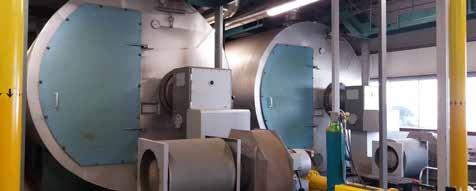
A: Compliance deadlines are based on the plant’s size and age:
NOW New Plants (commissioned after 20 December 2018): Must comply with emission limits immediately 01 JAN 2025 Existing Plants (5-50 MW): Must comply by 01 January 2025
JAN 2030 Existing Plants (1-5 MW): Must comply by 01 January 2030
Sites with over 20 MW capacity may also need to meet additional energy efficiency measures under Schedule 24 or be permitted under the UK Emissions Trading Scheme (UK ETS).

NFU Energy offers a range of services to support businesses in meeting MCPD requirements:
1. Expert Guidance: We help businesses understand MCPD regulations and their impact.
2. Emissions Monitoring: Assistance with managing regular emissions monitoring and reporting to ensure compliance.
3. Technical Support: Recommendations for upgrades or changes to plant operations to meet standards.
4. Permit Application Assistance: Help with preparing and submitting MCPD permit applications.
5. Ongoing Compliance Management: Continuous support to ensure ongoing compliance and adaptation to future regulations.
NFU Energy is committed to helping businesses meet MCPD requirements efficiently, reducing the risk of non-compliance. For support, call us at 024 7669 6512 or email sales@nfuenergy.co.uk Quote “NFU Magazine” when you contact us to be entered into a prize draw before 31 January 2025 for a chance to win £150 worth of Amazon vouchers!

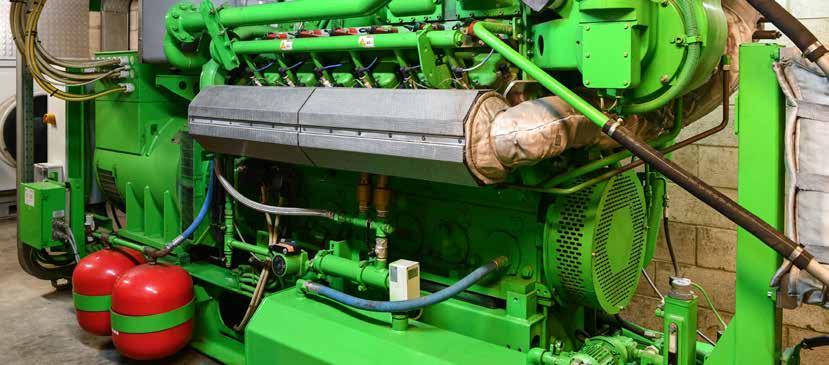

Steve Leil is the Compliance Scheme Manager at NFU Energy, where he oversees a variety of regulatory compliance schemes. With extensive knowledge in managing the Climate Change Levy (CCL), Combined Heat and Power Quality Assurance (CHPQA), and the UK Emissions Trading Scheme (UK ETS), Steve helps businesses stay compliant and optimise their energy strategies. His expertise in environmental regulations and energy efficiency makes Steve a trusted adviser for businesses looking to cut costs while achieving sustainability goals. In this Q&A, Steve discusses the relationship between CCL and CHPQA and how businesses can benefit from tax relief through these schemes. We catch up with Steve who explains the benefits of gas CHP systems and how it can equate to benefitting from 100% CCL tax relief.
Q: What is the Climate Change Levy and how does it impact businesses?
A: CCL is a tax imposed on businesses for the energy they consume, with the goal of encouraging energy efficiency and lowering carbon emissions. For businesses in energy-intensive sectors like horticulture, this levy can add substantial costs to their operations. However, businesses can reduce these costs significantly through CCL relief schemes. For example, under the NFU CCL Scheme, horticulture, pig and poultry members can claim up to 92% relief on electricity and 88% on gas, providing huge savings.
Q: How are the CCL and CHPQA connected, and why is CHPQA important for businesses with CHP units?
A: CCL and the CHPQA scheme are closely linked. CHPQA certification is essential for businesses operating Combined Heat and Power (CHP) units to qualify for 100% relief
on the gas they use in their CHP systems. Without this certification, businesses would be required to pay the full CCL on the gas, missing out on substantial tax savings. CHPQA ensures that CHP units meet specific efficiency and environmental standards, which is why it’s so important for businesses to participate. Given that CHP plants consume large amounts of gas, obtaining CCL relief through CHPQA can result in significant savings. At NFU Energy, we assist businesses with every step of the CHPQA process - from securing initial certification to managing ongoing submissions, ensuring they remain compliant and continue to benefit from these tax savings.
Q: Are there any other tax considerations for CHP operators?
A: Yes, for larger plants, particularly those over 2MWe, there is an additional tax known as the Carbon Price Support (CPS)
tax. If your plant generates electricity from fossil fuels, you are liable for CPS tax in addition to the CCL. However, NFU Energy provides support here too. We calculate CPS tax obligations and handle all reporting requirements with HMRC, ensuring businesses remain compliant while minimising their tax exposure.
Q: How does NFU Energy help businesses with CCL and CHPQA compliance?
A: We offer a comprehensive service to guide businesses through every stage of CCL and CHPQA compliance. From securing CCL relief through climate change agreements to navigating the complex CHPQA process and managing CPS tax reporting, NFU Energy takes care of the heavy lifting. This allows businesses to focus on their day-to-day operations while knowing that they’re optimising their tax savings and remaining fully compliant.
For support, call us at 024 7669 6512 or email sales@nfuenergy.co.uk. Quote “NFU Magazine” when you contact us to be entered into a prize draw before 31 January 2025 for a chance to win £150 worth of Amazon vouchers!












For over 40 years, R&L Holt Ltd. has been a family-owned horticultural business growing tomatoes in the heart of the Vale of Evesham. Under the leadership of Roly Holt, the company operates across three sites, producing high-quality tomatoes year-round. With sustainability and efficiency at the core of its operations, R&L Holt Ltd. has faced significant challenges due to rising energy costs and the complexities of managing diverse energy systems, from biomass and Combined Heat and Power (CHP) to solar and gas boilers. Fortunately, NFU Energy’s Energy Account Management service has played a pivotal role in ensuring the business remains energy efficient and financially resilient.
Roly Holt vividly recalls how energy costs have evolved over the years: “Up until about ten years ago, we were predominantly using gas boilers, but with the rise in gas prices, we knew we needed to explore other options. Fortunately, with the Renewable Heat Incentive (RHI) coming into play, we were able to invest in biomass heating systems and later biomass CHP. To further reduce costs, we installed solar energy across all three sites,” Roly explains. These steps were essential not only for reducing energy costs but also for ensuring the business’s sustainability.
However, as R&L Holt Ltd.’s energy infrastructure became more complex, so did the administrative burden. Multiple compliance schemes, meter changes,


and submission requirements became an overwhelming challenge for the team, which is where NFU Energy’s expertise came into play.
NFU Energy’s Energy Account Management service offered a lifeline to R&L Holt Ltd. by taking the complexity out of managing energy systems, contracts, compliance, and sustainability initiatives. According to Ed Kimberley, NFU Energy’s account manager for R&L Holt Ltd., the service is designed to be a “360-degree support system,” helping businesses like R&L Holt Ltd. manage everything from energy trading and compliance to renewable feasibility assessments.
For R&L Holt Ltd., one of the biggest advantages has been NFU Energy’s expertise in managing the N2EX trading


market for their gas CHP systems. By locking in energy sales two days in advance, the business has achieved financial stability and predictable earnings. “If we were on imbalance prices, it would be like gambling – we wouldn’t know what our sales would be,” Roly explains.
Over the past five years, this participation in the N2EX market has generated an impressive £3million for R&L Holt Ltd. by selling excess electricity back to the grid. The gas CHP engine has become a cornerstone of their energy strategy, providing not only electricity but also heat and CO2, which are critical for tomato cultivation, particularly during the winter months.
NFU Energy’s role has also been crucial in helping R&L Holt Ltd. maximise its earnings through compliance schemes like the RHI, while also significantly reducing the administrative burden. By managing the intricate tasks required for submissions to Ofgem and ensuring that the business


stays up to date with mandatory meter changes, NFU Energy has not only saved valuable time but also secured significant savings. “The RHI scheme helped us transition to more sustainable heating methods, and NFU Energy took the headache out of the compliance aspect,” Roly explains.
This support extends to other schemes, including the Climate Change Agreement and Combined Heat and Power Quality Assurance (CHPQA), where compliance is critical. “There’s so much you have to be aware of with these schemes,” Roly adds, “NFU Energy takes care of all of that, so we can focus on growing tomatoes and running our business.”
Thanks to NFU Energy’s support with compliance, in the last five years R&L Holt Ltd. has achieved an impressive £5million in earnings through the RHI as well as £700,000 in Climate Change Levy tax relief. This has not only bolstered the company’s bottom line but has also enabled further investments in energy efficiency and sustainability.
Beyond the financial gains, Roly has seen considerable operational improvements thanks to NFU Energy’s energy management. With a clearer understanding of their energy efficiency, the business has been able to streamline operations and make data-driven decisions. For instance, monitoring the efficiency of their gas and
biomass boilers has allowed them to stay ahead of maintenance needs and minimise energy wastage.
Over the years, NFU Energy’s close working relationship with R&L Holt Ltd. has become vital for the business’s energy strategy. “The relationship we have with NFU Energy is relaxed and fun, but it’s also highly professional. We get good feedback, and if we’re unsure about something, we can always call them for advice and guidance,” Roly says.
Looking ahead, energy savings and sustainability remain a top priority for R&L Holt Ltd. The company is committed to further optimising its energy usage, with NFU Energy continuing to play an integral role. “Energy savings are critical because we’re so dependent on it. We’re always looking for ways to be more streamlined, not just yearly, but almost weekly,” Roly concludes.
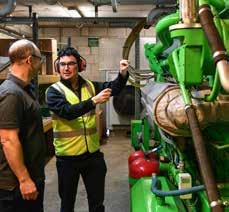
NFU Energy’s Energy Account Management service has been instrumental in helping R&L Holt Ltd. manage their energy in an increasingly challenging environment. From significant cost savings to operational efficiencies and


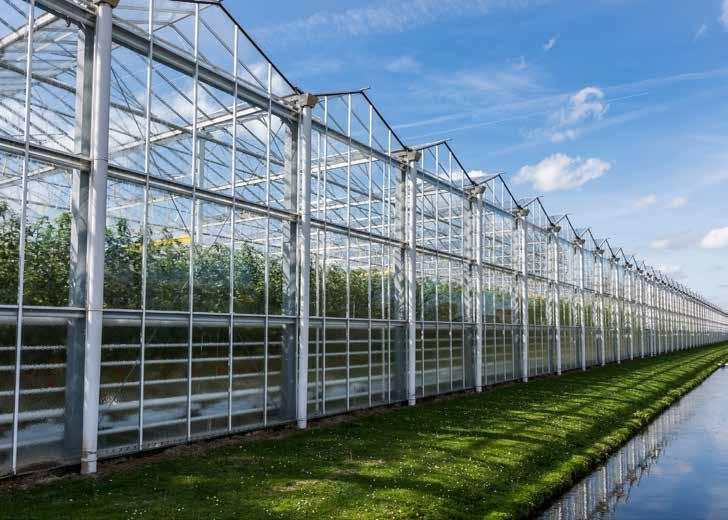


At NFU Energy, we know many UK farmers and growers already use solar PV systems to power their farms or sell surplus energy back to the grid. But have you considered adding a battery? Retrofitting battery storage can reduce reliance on the grid and provide backup power during outages.
Expanding your solar system with more panels can also increase energy generation and unlock new revenue streams. By boosting capacity, you could benefit from Smart Export Guarantee (SEG) payments or Power Purchase Agreements (PPA) to sell extra energy, enhancing your farm’s income.
Our Renewable Energy Solutions team works with approved installers to find the best battery and solar expansion strategy for your farm. Here’s why both options can be game-changers:
1. Maximise Your Solar Power Usage
By storing excess solar energy generated during the day, you can use it when your farm’s demand peaks outside daylight hours. This is particularly beneficial for energy-intensive operations like dairy farms and cold storage. A battery allows you to reduce your dependence on grid electricity and make the most of your solar PV system.
2. Increase Your Energy Self-Sufficiency
With battery storage, you can maximise the amount of solar energy you use onsite, reducing the need to rely on external suppliers. Rather than exporting unused electricity back to the grid, you can store it for your own use, giving you greater control over your energy consumption.
3. Reduce Energy Costs with Time-of-Use Tariffs
Battery storage systems enable you to optimise time-of-use tariffs by storing energy during cheaper periods and using it during peak hours. This can significantly lower your energy bills, as you avoid using grid electricity when prices are highest.
4. Backup Power During Outages
Many battery systems provide emergency power supply capabilities, so you can access stored energy during power cuts.

This is crucial for rural or isolated farms, where grid outages can cause costly downtime, particularly for refrigeration, irrigation, or essential machinery.
Battery storage systems are modular and upgradeable, allowing you to increase capacity as your energy needs grow. If you’re unsure about the right size, you can monitor your energy usage over a sixmonth period to help determine the best solution for your farm.
Batteries typically last 10-15 years, with a payback period of seven years or less. At current electricity prices, storing and consuming around 28,000 kWh makes a 12kWh battery, installed at approximately £7,000, a sound financial investment. With the right system, the long-term savings on energy bills will more than cover the upfront cost. Similarly, by installing more solar panels, you can increase your eligibility for SEG payments and PPAs, generating additional income by selling surplus energy to the grid, creating longterm financial gains.
Many battery models are IP65-rated, meaning they can be safely installed outdoors. This saves valuable indoor space while also reducing health and safety risks in storage or operational areas.
AC-connected batteries integrate easily with all grid-tied solar PV and wind systems, meaning your Feed-in Tariff (FiT) payments remain unaffected. You’ll continue to benefit from both generating income through FiT and using stored energy when you need it most. Furthermore, expanding your PV system does not disrupt existing FiT arrangements, but instead, allows you to increase your export potential through the SEG or via a PPA, generating even more revenue.
Whether your goal is to reduce energy costs, enhance your farm’s energy security, or contribute to a more sustainable future, installing a battery storage system is a smart investment. By optimising the use of your solar PV, you’ll gain greater control over your energy consumption, lower your reliance on the grid, and future-proof your farm against rising energy prices.


For support, call us at 024 7669 6512 or email sales@nfuenergy.co.uk. Quote “NFU Magazine” when you contact us to be entered into a prize draw before 31 January 2025 for a chance to win £150 worth of Amazon vouchers!
At NFU Energy, we understand that energy efficiency is key to running a sustainable and profitable farming business. While our Energy Audits provide a comprehensive assessment of where, when, and how you use energy—with the goal of cutting costs and improving efficiency—there are some quick wins you can achieve on your own. If you’re looking to make immediate improvements, here are four essential steps that can set you on the path to reducing energy consumption and enhancing your farm’s overall efficiency.
Understanding your energy consumption is the first step toward reducing it. Begin by measuring how much fuel, gas, and electricity your operations consume. Utilise energy measurement devices to break down usage by system, allowing you to identify specific areas where efficiency improvements can be made. This foundational knowledge empowers you to make informed decisions about energy management.
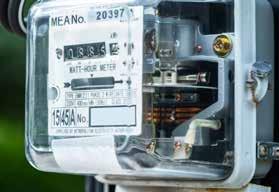
Once you have a clear picture of your energy usage, consider the potential benefits of upgrading your equipment. Compare the costs of modern, energysaving technologies against the savings they could yield. Common upgrades include inverter-driven fans, pumps, and motors, as well as heat recovery systems, light sensors, and timers. Investing in modern equipment can lead to significant reductions in energy consumption and operational costs.
With modern technology in place, there’s still room for improvement. Optimise your system by ensuring that your equipment operates during off-peak energy times. This might mean running machinery overnight under an Economy 7 tariff or using solar electricity during the day. Additionally, consider implementing thermal energy storage solutions, such as hot or cold water storage, to take advantage of excess energy. Linking systems together to utilise waste energy can also lead to considerable savings; for instance, capturing waste heat from refrigeration to heat water.
To measure the effectiveness of your energy efficiency initiatives, use appropriate measurement devices to create a before-and-after snapshot of your energy consumption. This verification is essential not only for tracking your progress but also for compliance with any schemes that require evidence of your energy efficiency efforts and carbon emissions reductions.
By taking these initial steps, you can begin making noticeable improvements in energy efficiency, cutting costs and enhancing sustainability. While these tips offer a solid starting point, deeper insights and tailored strategies can create even greater savings. NFU Energy’s Energy Audits are designed to provide you with an in-depth understanding of your energy usage and practical recommendations to help you achieve long-term efficiency goals. Whether you’re looking to make small adjustments or significant upgrades, we’re here to help you every step of the way.

Looking for assistance? Here’s who to call:
• Electricity, Water, or Gas Contracts: Call the Contracts team on 024 7669 8885
• Standing Charge Banding Reduction: Contact the Commercial Contracts team on 024 7669 8910
• Renewable Energy Solutions: Ready to go renewable? Call the team on 024 7669 6512
• Energy Account Management: Need help managing your business’s energy needs? Get in touch with the team on 024 7669 6512
• Renewable Heat Incentive (RHI) Support: Looking for assistance with RHI compliance or HealthChecks? Contact our team on 024 7669 6512
• Compliance and Regulatory Advice: Need help with compliance regulations, including, but not limited to CHPQA, CCL and MCPD? Call the team on 024 7669 6512
• Energy Audits and Feasibility Studies: Looking for ways to improve energy efficiency or assess project viability? Contact the team on 024 7669 6512
• General Enquiries: Have a question or need assistance? Call our team on 024 7669 6512

Newprocesses and technologies arealways beingintroduced into the agricult industry,meaning businesses in the sectorare primed to adaptand embrace c Given thatopenness to evolving their businesses, moreand morepeoplework agricultureare considering howtoweave sustainablepractices into their oper
At ScottishPower, we arecommitted to supporting alltypes of businesses to g greener,helping to manage energy bills and future-proofprocesses allwhile d the rightthing forbusinesses and forthe planet.
Sign up to a green energy tariff
It sounds likeasimplechoice and with ScottishPower’sRenewable ForBusiness tariff,itreally is. This 100% green energy tariff*guarantees thatevery unit of electricity your business uses, is matched with 100% renewableenergygenerated by ScottishPower from renewable sources righthereinthe UK –good forbusiness and good forthe planet.
This tariffconsists of twoparts:a fixed elementfor the energy we supplyand avariableelement which takes account of industry charges thatcouldvaryeachquarter Youcan find outmoreabout the renewabletariff and see whether a short term or longer term contract worksbestfor your business at scottishpower.co.uk/forbusiness


ural hange ing in ations o oing

Install smartmeters to understand energy usage
To help understand your energy usage,agricultural leadersshould consider installing smartmeters. Theysharenearreal-time data on energy usage directlywith your energy supplier,ensuring thatyour energy bills arebased on your actual consumption. This means no moreestimatedbills** and, via online platforms, businesses can monitor howmuch energy theyuse to discoverwheretheycouldmake savings.
With ScottishPower’seasy
installation processes, asmart meter can be up and running quicklyto work foryou.Once youunderstand whereyou areusing your energy, youcan look to make changes, big or small, thatcouldimprove your efficiency.
Knowing wheretostart can be daunting. That’swhy ScottishPowerhas createdagreen energy guide which youcan download at scottishpower.co.uk/greener-business.The guide contains toolstohelp youunderstand energy usage,information on howtoboostabusiness’s finances through green energy generation and the practical steps to achieving netzero, because going greener makes good business sense
Ready to start your green journeytoday? Getintouch with aScottishPower energy expert by emailing smart.solutions.sales@scottishpower.com

*Our business green tariffsare backed by 100% green electricity,made by our windfarms in the UK.
**Theremay be times when we areunabletocommunicate with your meterand we wouldneedtorelyon an estimate
Invest in green tech
If youhavealready looked into a renewableenergy tariffand installed asmart meter, youcouldbeready forthe next step.Fromsolar panels to EV charge points, our green tech solutions can help your business reduceits energy costsand even increase revenue -itcouldbeeasier than youthink.
Forexample, if youhavespare unused farmland in asuitable location or adedicatedfarm shop car park, youcouldbecome apublic EV charge pointhost. We canwork with youtoinstallour fully-funded EV public charge points. We’d lease the space from you, cover the installation costs, and you’d earn acut of the revenue every time someone used the charge point. Find out if youare eligibleat scottishpower.co.uk/business/evcharging/public
Or your sitemightbesuitablefor solar panelsthatcouldgenerate the energy youneed and you couldpotentiallysellany surplus electricity your business generates back to the grid with our smart export guaranteetariff Justacoupleofwaysthatworking with ScottishPowercouldhelp make your land or premises work even harder foryou.
We provide zero standing charge, flexible electricity,with plans tailored to suitfarms, rural businesses and communities.
Solar PV,battery storage and fixed electricity bundles are just some of thereasons whyrural, off-gas businessesare switching to Tomato Energy forcost-effectiveand sustainable living. Only payfor the energyyou use.
